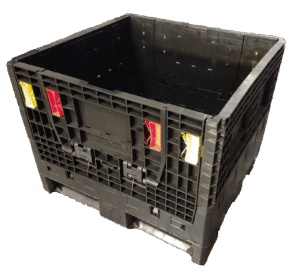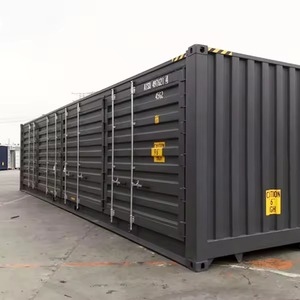The importance of used plastic containers in sustainable material handling
Wiki Article
The Ultimate Overview to Choosing the Right Bulk Containers for Your Business Needs
Selecting the ideal mass containers is critical for any organization that depends on effective logistics. Various kinds of containers exist, each developed for particular materials and applications. Aspects such as size, material compatibility, and regulative requirements play a substantial duty in this decision-making process. Comprehending these elements can bring about boosted functional effectiveness. Lots of services neglect vital facets that can enhance their overall efficiency and sustainability. What are these considerations?Recognizing Different Types of Bulk Containers
Bulk containers function as necessary tools for businesses seeking reliable storage space and transport options. These containers come in numerous kinds, each developed to fulfill certain functional needs. One common type is the intermediate mass container (IBC), which is ideal for granulated and liquid products, supplying a balance of capacity and ability to move. One more preferred choice is the mass bag, or FIBC, ideal for dry, flowable items. These versatile containers are lightweight and can be conveniently delivered and stored. For much heavier materials, rigid bulk containers are often employed, offering durability and security for risk-free handling. Furthermore, there are specific containers customized for dangerous products, making sure compliance with security regulations. Understanding the unique characteristics of these bulk container kinds permits businesses to make educated choices that enhance logistics and minimize expenses. By selecting the ideal container, firms can enhance their functional efficiency and enhance their supply chain processes.Secret Material Considerations for Bulk Containers
When picking mass containers, it is necessary to consider the products utilized in their building. Variables such as chemical, sturdiness, and stamina compatibility play a vital duty in ensuring the containers meet certain operational needs. Furthermore, weight and transportability issues can influence both effectiveness and transportation logistics.Material Resilience and Strength
Sturdiness and toughness are essential factors in selecting products for mass containers, as they straight affect the container's ability to endure various environmental conditions and handling processes. Materials such as high-density polyethylene (HDPE), polypropylene, and stainless steel are commonly favored for their robust buildings, supplying resistance to temperature level, influence, and abrasion fluctuations. The selection of material also affects the overall lifespan of the container; more powerful materials generally result in much less constant substitutes, resulting in cost financial savings with time. In addition, the weight of the product can affect shipping prices and simplicity of handling. Services have to consider their certain functional atmospheres and the potential for deterioration to assure peak durability and toughness in their bulk container selection.Chemical Compatibility Factors
Recognizing chemical compatibility is crucial for picking mass containers, as the products utilized should withstand the particular substances they will certainly hold. Various factors affect compatibility, consisting of the chemical nature of the materials, temperature level, and duration of storage space. Destructive chemicals may call for containers made from stainless steel or specialized plastics that stand up to deterioration. Additionally, responsive materials can generate warmth or gases, demanding vented or pressure-rated containers. The choice of container product, whether polyethylene, metal, or polycarbonate, need to align with the chemical buildings of the stored compounds to stop violations or leakages. Ultimately, a complete analysis of these compatibility elements ensures secure handling and storage, securing both personnel and the environment while keeping item honesty.Weight and Transportability Issues
Picking mass containers includes not only reviewing chemical compatibility yet also taking into consideration weight and transportability. Companies have to evaluate the convenience of handling and transportation to maximize performance. Lightweight products like high-density polyethylene (HDPE) or aluminum can promote much easier motion and lower delivery prices. Alternatively, larger containers might give improved sturdiness however can hinder wheelchair, specifically in atmospheres requiring constant relocation. In addition, the design of the container ought to enable for practical lifting and stacking, making sure ergonomic security for workers. Business need to additionally take into consideration the infrastructure offered for transport; as an example, containers compatible with forklifts or pallet jacks can streamline operations. Inevitably, the appropriate equilibrium in between weight and transportability straight affects operational performance and cost effectiveness.Sizing Your Bulk Containers for Optimum Performance
When sizing mass containers, services must thoroughly evaluate the dimensions called for to accommodate their particular items. In addition, weight capability is an essential variable that influences efficiency and safety during transportation and storage. Effective sizing not only maximizes room however likewise maximizes functional operations.Establishing Container Capacities
Choosing the right dimensions for mass containers is important for optimizing efficiency in storage space and transport. Businesses should analyze their particular needs, thinking about aspects such as offered space, the nature of the products being kept, and the methods of transport made use of. Exact measurements guarantee that containers fit preferably in storage facilities and vehicles, lessening wasted room and reducing managing time. Standard sizes can use convenience, however personalized dimensions could be needed for unique requirements or to accommodate details items. In addition, it is very important to assess stacking abilities and ease of access, as these factors influence used collapsible containers overall functional performance. Eventually, the best measurements cause boosted organization and streamlined logistics, benefiting the general efficiency of business.Weight Ability Considerations
Comprehending weight capacity is important for organizations aiming to optimize their mass container efficiency. The weight capacity of a container straight impacts storage space capacities, transportation logistics, and overall operational expenses. Choosing containers with the ideal weight restrictions assures that organizations can safely store and carry their products without running the risk of damage or compliance issues. Straining containers can result in structural failings, while underutilizing ability cause wasted sources. When picking containers, it is crucial for organizations to assess their item weights and think about any regulatory demands. Additionally, elements such as the kind of material, planned usage, and ecological conditions should additionally influence weight capability decisions. By evaluating these components, services can improve efficiency and ensure a streamlined supply chain.Governing Conformity and Security Requirements

Governing compliance and security standards play an essential duty in the choice of bulk containers for organizations. Organizations needs to assure that their containers satisfy different laws set by local, national, and global authorities. These criteria usually relate to material security, architectural stability, and correct labeling, which assist protect against crashes and ensure the risk-free transportation of products.
In addition, adherence to industry-specific standards, such as those from the Fda (FDA) or the Occupational Safety and Health Management (OSHA), is crucial for firms taking care of hazardous materials or food. Non-compliance can cause fines, legal problems, or damages to a service's online reputation.
Businesses should also consider the container's compatibility with the materials being stored or carried to stay clear of contamination or chain reaction (used bulk containers). To summarize, comprehending and executing regulative compliance and security criteria is essential for the accountable and effective use mass containers
Sustainability Alternatives for Eco-Friendly Bulk Containers

Companies are additionally discovering choices made from recycled products, which not only save sources but additionally support the recycling sector. In addition, advancements in design permit lighter containers that call for much less energy to transport, better enhancing sustainability. By incorporating these eco-friendly bulk container options, businesses can demonstrate their dedication to ecological stewardship while satisfying consumer need for lasting practices. This change not only assists the world but can likewise enhance brand name reputation and client commitment.
Cost-Effectiveness and Budgeting for Mass Containers
While several companies focus on sustainability, cost-effectiveness remains an important factor when picking bulk containers. Organizations should analyze the first purchase rate, as well as lasting operational costs, to ensure financial viability. Aspects such as reusability, upkeep, and resilience play a considerable function in establishing total costs.Buying top notch containers may produce higher ahead of time costs however can result in savings through reduced substitute prices and lowered waste. Additionally, organizations ought to think about transport costs and storage space efficiency, as these can affect the general spending plan.

Often Asked Questions
Just how Do I Determine the Right Container for Hazardous Materials?
To establish the appropriate container for hazardous materials, one need to review compatibility with the compound, think about the container's product, look for governing compliance, and evaluate ability and safety features to guarantee correct handling and storage space.Can Bulk Containers Be Personalized for Details Products?
Yes, bulk containers can be customized for details items. refurbished bulk containers. Numerous features, such as style, size, and material, can be customized to fulfill special needs, ensuring perfect safety and security and effectiveness for transporting and storing different productsWhat Is the Ordinary Life-span of Various Bulk Container Kind?
The typical lifespan of bulk container types differs; plastic containers last 5-10 years, metal containers 10-20 years, and wood containers usually last 3-7 years, depending upon usage, maintenance, and environmental conditions.Just how Should I Tidy and Maintain Mass Containers?
To cleanse and keep bulk containers, one must regularly check for damage, eliminate deposit, clean with suitable cleaning agents, wash thoroughly, and assurance appropriate drying before storage space. Adhering to producer guidelines improves longevity and security during usage.Exist Rental Choices for Mass Containers Available?
Yes, countless companies supply rental choices for mass containers, providing versatility for services. These rentals can fit numerous demands, enabling firms to handle stock efficiently without the commitment of buying containers outright.Durability and strength are critical elements in choosing materials for bulk containers, as they directly affect the container's ability to withstand numerous ecological problems and taking care of procedures. Recognizing chemical compatibility is vital for picking bulk containers, as the products used should withstand the details substances they will hold. Recognizing weight capacity is essential for services aiming to optimize their bulk container performance. Governing conformity and security requirements play an important function in the selection of mass containers for businesses. While many businesses concentrate on sustainability, cost-effectiveness continues to be a vital factor when selecting bulk containers.
Report this wiki page